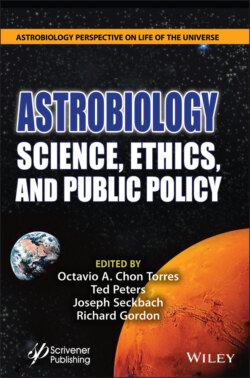Читать книгу Astrobiology - Группа авторов - Страница 46
2.5 Conclusion
ОглавлениеWhere have we been? I have proposed an “astroethics of responsibility” founded on a substructure of quandary-responsibility ethics. Atop this foundation, the load-bearing vertical supports included: (1) the moral agent: earthlings as a single planetary community of moral deliberation; (2) the moral norm: the galactic common good; (3) the moral spheres: the solar neighborhood and the Milky Way metropolis; (4) the moral justification: a theological grasp of the common good plus a naturalistic grasp of the Golden Rule. The floor plan designated a conference room for each of thirteen previously formulated ethical issues.
I distinguished two spheres of astrobiological application: the solar neighborhood and the Milky Way metropolis. Within the sphere of the solar neighborhood, ten already articulated quandaries were addressed: (1) planetary protection; (2) intrinsic value of off-Earth biospheres; (3) application of the Precautionary Principle; (4) space debris; (5) satellite surveillance; (6) weaponization of space; (7) scientific versus commercial space exploration; (8) terraforming Mars; (9) colonizing Mars; and (10) anticipating natural space threats [2.66]. Within the sphere of the Milky Way metropolis in which the “galactic commons” becomes the astroethical norm, engagement with intelligent extraterrestrials was analyzed within three categories: (1) ETI less intelligent than Earth’s Homo sapiens; (2) ETI equal in intelligence; and (3) ETI superior in intelligence in both biological and postbiological forms [2.66].
I have argued that we should nominate earthlings in the form of a “single planetary community of moral deliberation” to the office of moral agent. This earth-born community should then look to the sky and allow our planet’s place in the immense and unfathomable universe to affect our shared consciousness. I support the mandate of naturalist Steven Dick regarding the decisive role that cosmic consciousness needs to play in developing an astroethics of responsibility. “A cosmic perspective is surely in order as we expand our views of the space environment, including (and especially) life. Such a view will not happen overnight, but perhaps, humanity will increase its awareness in stages, as we encounter the universe in increasingly intimate ways that will become a basic part of what it means to be human, or post-human” [2.27].
